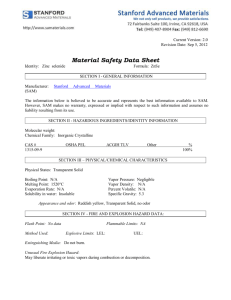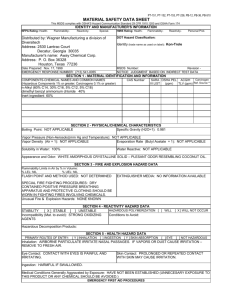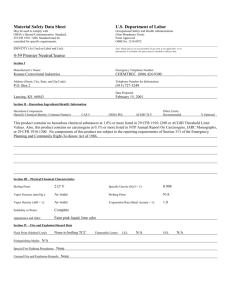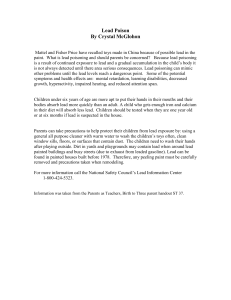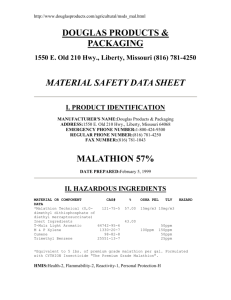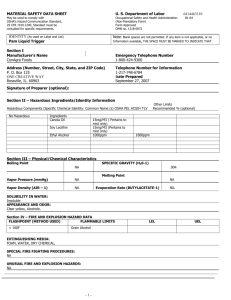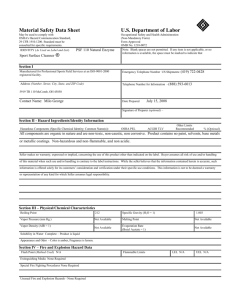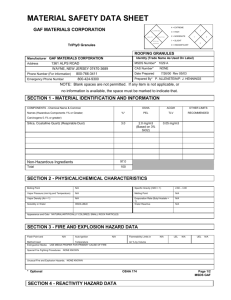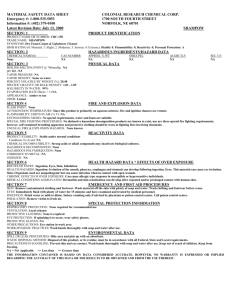MSDS
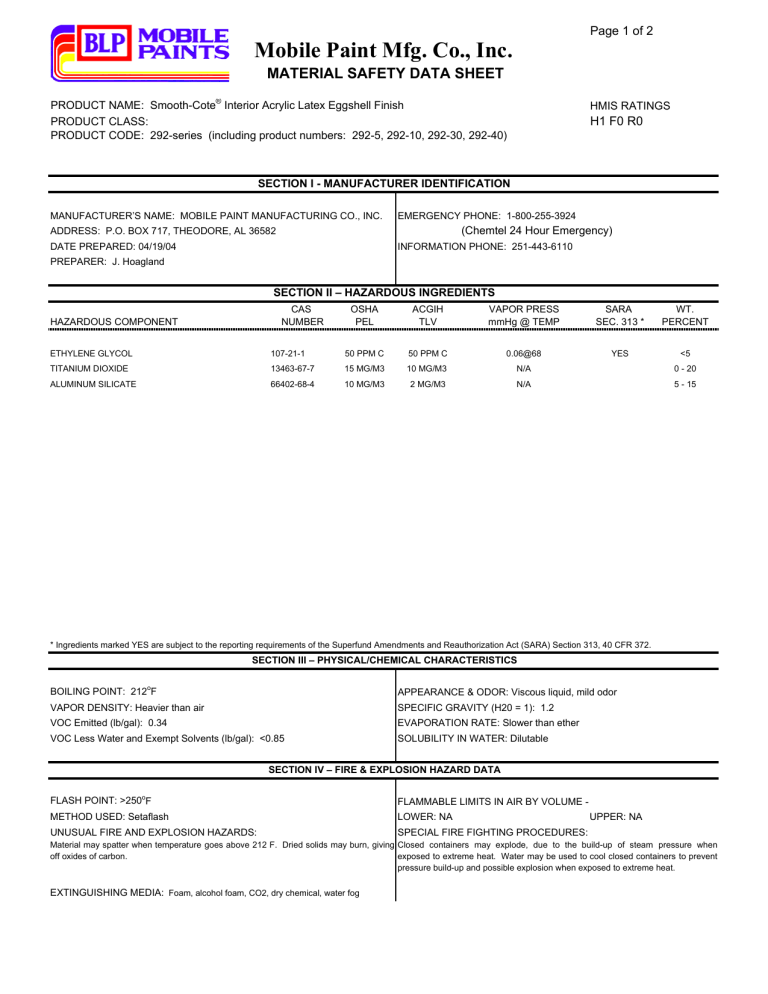
Page 1 of 2
Mobile Paint Mfg. Co., Inc.
MATERIAL SAFETY DATA SHEET
PRODUCT NAME: Smooth-Cote
®
Interior Acrylic Latex Eggshell Finish
PRODUCT CLASS:
PRODUCT CODE: 292-series (including product numbers: 292-5, 292-10, 292-30, 292-40)
HMIS RATINGS
H1 F0 R0
SECTION I - MANUFACTURER IDENTIFICATION
MANUFACTURER’S NAME: MOBILE PAINT MANUFACTURING CO., INC.
EMERGENCY PHONE: 1-800-255-3924
ADDRESS: P.O. BOX 717, THEODORE, AL 36582
(Chemtel 24 Hour Emergency)
DATE PREPARED: 04/19/04 INFORMATION PHONE: 251-443-6110
PREPARER: J. Hoagland
HAZARDOUS COMPONENT
SECTION II – HAZARDOUS INGREDIENTS
CAS
NUMBER
OSHA
PEL
ACGIH
TLV
VAPOR PRESS mmHg @ TEMP
SARA
SEC. 313 *
WT.
PERCENT
ETHYLENE GLYCOL
TITANIUM DIOXIDE
ALUMINUM SILICATE
107-21-1
13463-67-7
66402-68-4
50 PPM C
15 MG/M3
10 MG/M3
50 PPM C
10 MG/M3
2 MG/M3
0.06@68
N/A
N/A
YES <5
0 - 20
5 - 15
* Ingredients marked YES are subject to the reporting requirements of the Superfund Amendments and Reauthorization Act (SARA) Section 313, 40 CFR 372.
SECTION III – PHYSICAL/CHEMICAL CHARACTERISTICS
BOILING POINT: 212 o
F
VAPOR DENSITY: Heavier than air
VOC Emitted (lb/gal): 0.34
VOC Less Water and Exempt Solvents (lb/gal): <0.85
APPEARANCE & ODOR: Viscous liquid, mild odor
SPECIFIC GRAVITY (H20 = 1): 1.2
EVAPORATION RATE: Slower than ether
SOLUBILITY IN WATER: Dilutable
SECTION IV – FIRE & EXPLOSION HAZARD DATA
FLASH POINT: >250 o
F
METHOD USED: Setaflash
FLAMMABLE LIMITS IN AIR BY VOLUME -
LOWER: NA UPPER: NA
UNUSUAL FIRE AND EXPLOSION HAZARDS: SPECIAL FIRE FIGHTING PROCEDURES:
Material may spatter when temperature goes above 212 F. Dried solids may burn, giving Closed containers may explode, due to the build-up of steam pressure when off oxides of carbon.
exposed to extreme heat. Water may be used to cool closed containers to prevent pressure build-up and possible explosion when exposed to extreme heat.
EXTINGUISHING MEDIA: Foam, alcohol foam, CO2, dry chemical, water fog
Page 2 of 2
Mobile Paint Mfg. Co., Inc.
MATERIAL SAFETY DATA SHEET
Product Name: Smooth-Cote
®
Interior Acrylic Latex Eggshell Finish
PRODUCT CODE: 292-series (including product numbers: 292-5, 292-10, 292-30, 292-40)
SECTION V – REACTIVITY DATA
CONDITIONS TO AVOID: Fire, extremely high temperatures STABILITY: Stable
INCOMPATIBILITY (MATERIALS TO AVOID): None
HAZARDOUS DECOMPOSITION OR BYPRODUCTS: By fire may produce carbon monoxide, carbon dioxide.
HAZARDOUS POLYMERIZATION: Will not occur.
SECTION VI – HEALTH HAZARD DATA
PRIMARY ROUTE(S) OF ENTRY: Inhalation, skin contact, eye contact, ingestion.
EFFECTS OF OVEREXPOSURE - ACUTE: EFFECTS OF OVEREXPOSURE - CHRONIC:
Dizziness, headache, nausea, confusion, irritation to upper respiratory tract (nose, throat), None known skin and eye irritation.
MEDICAL CONDITIONS GENERALLY AGGRAVATED BY EXPOSURE:
None expected when used in accordance with Safe Handling and Use information
(Section VII). May provoke asthmatic response in persons with asthma who are sensitive to airway irritants.
EMERGENCY AND FIRST AID PROCEDURES:
Inhalation: Remove to fresh air. Consult physician if there is difficulty in breathing.
Skin: Wash affected areas with soap and water.
Remove and launder contaminated clothing. Consult a physician if needed. Eyes: Flush immediately with large amounts of water for at least 15 minutes. Take to a physician for medical treatment. Ingestion: Drink 1 or 2 glasses of water to dilute. Do not induce vomiting. Consult a physician or Poison Control Center.
SECTION VII – PRECAUTIONS FOR SAFE HANDLING AND USE
STEPS TO BE TAKEN IN CASE MATERIAL IS RELEASED OR SPILLED: WASTE DISPOSAL METHOD:
Floors may be slippery, use care to avoid falls. Contain and remove with inert absorbent, Dispose of in accordance with local, state and federal regulations.
transfer to container for disposal. Keep spill out of municipal sewers and open bodies of water.
PRECAUTIONS TO BE TAKEN IN HANDLING AND STORING: OTHER PRECAUTIONS:
Do not store above 120 F. Store large quantities only in buildings designed to comply Do not get in eyes. Avoid skin contact. Wash contaminated clothing thoroughly.
with OSHA 1910.106. Keep closures tight and container upright to prevent leakage.
Wash skin thoroughly with soap and water after handling. Close container after
Never use pressure to empty. Drum must not be washed out or used for other purposes.
each use. Do not transfer this product to unlabeled containers. Do not handle until
Use with adequate ventilation. Avoid contact with skin and clothing.
the manufacturer's safety precautions have been read and understood. Keep out of reach of children.
SECTION VIII – CONTROL MEASURES
RESPIRATORY PROTECTION: VENTILATION:
Use NIOSH approved respirator specified for protection against paint spray mist and Provide ventilation in volume and pattern to keep TLV and LEL below acceptable sanding dust during spray application or sanding of dried paint.
limits (see Sections II and IV). Open windows and doors to keep paint odor at minimum. Mechanical exhaust (fan) may be required in confined areas. These coatings may contain materials classified as nuisance particulates which may be present at hazardous levels only during sanding or abrading of the dried film. If no specific dusts are listed in Section II, the applicable limits for nuisance dusts are
ACGIH TLV 10 mg/m3 (total dust), OSHA PEL 15 m g/m3 (total dust), 5 mg/m3
(respirable fraction).
PROTECTIVE GLOVES:
Use gloves impervious to water and soap.
OTHER PROTECTIVE CLOTHING OR EQUIPMENT:
Use protective outerwear and prevent prolonged skin contact with contaminated clothing.
EYE PROTECTION:
Safety eyewear including splashguards or side shields recommended.
WORK/HYGIENIC PRACTICES:
Avoid breathing vapors and contact with skin. Wash skin thoroughly before breaks and meals and at end of work period.
SECTION IX – DISCLAIMER
DISCLAIMER: The information provided in this MSDS has been obtained from sources believed to be accurate and reliable. It is furnished without warranty of any kind, express or implied. Recipients should determine that the information is current and suitable for the protection of the environment and the health and safety of your employees and users of this product.
